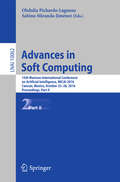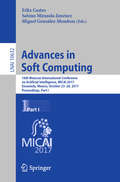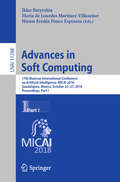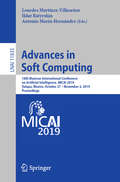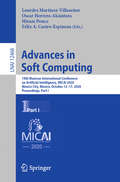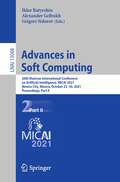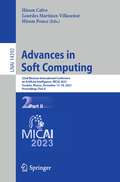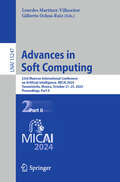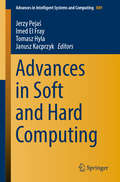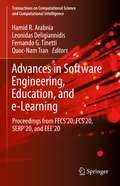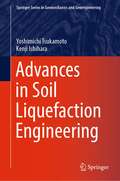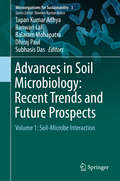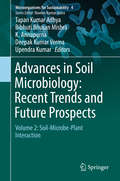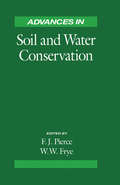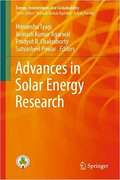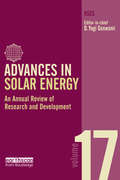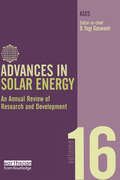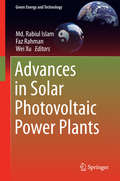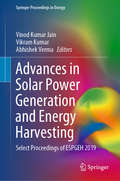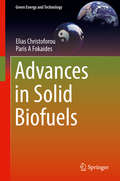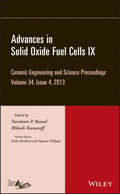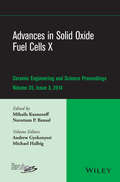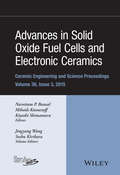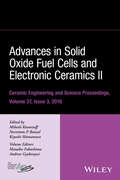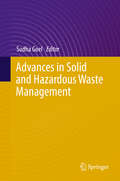- Table View
- List View
Advances in Soft Computing: 15th Mexican International Conference on Artificial Intelligence, MICAI 2016, Cancún, Mexico, October 23–28, 2016, Proceedings, Part II (Lecture Notes in Computer Science #10062)
by Obdulia Pichardo-Lagunas Sabino Miranda-JiménezThe two-volume set LNAI 10061 and 10062 constitutes the proceedings of the 15th Mexican International Conference on Artificial Intelligence, MICAI 2016, held in Canc#65533;n, Mexico, in October 2016. The total of 86 papers presented in these two volumes was carefully reviewed and selected from 238 submissions. The contributions were organized in the following topical sections: Part I: natural language processing; social networks and opinion mining; fuzzy logic; time series analysis and forecasting; planning and scheduling; image processing and computer vision; robotics. Part II: general; reasoning and multi-agent systems; neural networks and deep learning; evolutionary algorithms; machine learning; classification and clustering; optimization; data mining; graph-based algorithms; and intelligent learning environments.
Advances in Soft Computing: 16th Mexican International Conference on Artificial Intelligence, MICAI 2017, Enseneda, Mexico, October 23-28, 2017, Proceedings, Part I (Lecture Notes in Computer Science #10632)
by Sabino Miranda-Jiménez Félix Castro Miguel González-MendozaThe two-volume set LNAI 10632 and 10633 constitutes the proceedings of the 16th Mexican International Conference on Artificial Intelligence, MICAI 2017, held in Enseneda, Mexico, in October 2017. The total of 60 papers presented in these two volumes was carefully reviewed and selected from 203 submissions. The contributions were organized in the following topical sections: Part I: neural networks; evolutionary algorithms and optimization; hybrid intelligent systems and fuzzy logic; and machine learning and data mining. Part II: natural language processing and social networks; intelligent tutoring systems and educational applications; and image processing and pattern recognition.
Advances in Soft Computing: 17th Mexican International Conference on Artificial Intelligence, MICAI 2018, Guadalajara, Mexico, October 22–27, 2018, Proceedings, Part I (Lecture Notes in Computer Science #11288)
by Hiram Eredín Ponce Espinosa Ildar Batyrshin María de Lourdes Martínez-VillaseñorThe two-volume set LNAI 11288 and 11289 constitutes the proceedings of the 17th Mexican International Conference on Artificial Intelligence, MICAI 2018, held in Guadalajara, Mexico, in October 2018. The total of 62 papers presented in these two volumes was carefully reviewed and selected from 149 submissions. The contributions are organized in topical as follows:Part I: evolutionary and nature-inspired intelligence; machine learning; fuzzy logic and uncertainty management.Part II: knowledge representation, reasoning, and optimization; natural language processing; and robotics and computer vision.
Advances in Soft Computing: 18th Mexican International Conference on Artificial Intelligence, MICAI 2019, Xalapa, Mexico, October 27 – November 2, 2019, Proceedings (Lecture Notes in Computer Science #11835)
by Ildar Batyrshin Lourdes Martínez-Villaseñor Antonio Marín-HernándezThis volume constitutes the proceedings of the 18th Mexican Conference on Artificial Intelligence, MICAI 2019, held in Xalapa, Mexico, in October/November 2019. The 59 full papers presented in this volume were carefully reviewed and selected from 148 submissions. They cover topics such as: machine learning; optimization and planning; fuzzy systems, reasoning and intelligent applications; and vision and robotics.
Advances in Soft Computing: 19th Mexican International Conference on Artificial Intelligence, MICAI 2020, Mexico City, Mexico, October 12–17, 2020, Proceedings, Part I (Lecture Notes in Computer Science #12468)
by Oscar Herrera-Alcántara Lourdes Martínez-Villaseñor Hiram Ponce Félix A. Castro-EspinozaThe two-volume set LNAI 12468 and 12469 constitutes the proceedings of the 19th Mexican International Conference on Artificial Intelligence, MICAI 2020, held in Mexico City, Mexico, in October 2020. The total of 77 papers presented in these two volumes was carefully reviewed and selected from 186 submissions. The contributions are organized in topical as follows: Part I: machine and deep learning, evolutionary and metaheuristic algorithms, and soft computing. Part II: natural language processing, image processing and pattern recognition, and intelligent applications and robotics.
Advances in Soft Computing: 20th Mexican International Conference on Artificial Intelligence, MICAI 2021, Mexico City, Mexico, October 25–30, 2021, Proceedings, Part II (Lecture Notes in Computer Science #13068)
by Grigori Sidorov Alexander Gelbukh Ildar BatyrshinThe two-volume set LNAI 13067 and 13068 constitutes the proceedings of the 20th Mexican International Conference on Artificial Intelligence, MICAI 2021, held in Mexico City, Mexico, in October 2021.The total of 58 papers presented in these two volumes was carefully reviewed and selected from 129 submissions. The first volume, Advances in Computational Intelligence, contains 30 papers structured into three sections: – Machine and Deep Learning – Image Processing and Pattern Recognition – Evolutionary and Metaheuristic Algorithms The second volume, Advances in Soft Computing, contains 28 papers structured into two sections: – Natural Language Processing – Intelligent Applications and Robotics
Advances in Soft Computing: 22nd Mexican International Conference on Artificial Intelligence, MICAI 2023, Yucatán, Mexico, November 13–18, 2023, Proceedings, Part II (Lecture Notes in Computer Science #14392)
by Hiram Calvo Lourdes Martínez-Villaseñor Hiram PonceThe two-volume set LNAI 14391 and 14392 constitutes the proceedings of the 22nd Mexican International Conference on Artificial Intelligence, MICAI 2023, held in Yucatán, Mexico, in November 2023.The total of 49 papers presented in these two volumes was carefully reviewed and selected from 115 submissions.The proceedings of MICAI 2023 are published in two volumes. The first volume, Advances in Computational Intelligence, contains 24 papers structured into three sections:– Machine Learning– Computer Vision and Image Processing– Intelligent SystemsThe second volume, Advances in Soft Computing, contains 25 papers structured into three sections:– Natural Language Processing– Bioinformatics and Medical Applications– Robotics and Applications
Advances in Soft Computing: 23rd Mexican International Conference on Artificial Intelligence, MICAI 2024, Tonantzintla, Mexico, October 21–25, 2024, Proceedings, Part II (Lecture Notes in Computer Science #15247)
by Lourdes Martínez-Villaseñor Gilberto Ochoa-RuizThe two-volume set, LNAI 15246 and 15247, constitutes the proceedings of the 23rd Mexican International Conference on Artificial Intelligence, MICAI 2024, held in Tonantzintla, Mexico in October 21–25, 2024. The 37 full papers presented in these proceedings were carefully reviewed and selected from 141 submissions. The papers presented in these two volumes are organized in the following topical sections: Part I - Machine Learning; Computer Vision. Part II - Intelligent Systems; Bioinformatics and Medical Applications; Natural Language Processing.
Advances in Soft and Hard Computing (Advances In Intelligent Systems and Computing #889)
by Janusz Kacprzyk Imed El Fray Jerzy Pejaś Tomasz HylaThe book presents a collection of carefully selected, peer-reviewed papers from the 21st International Multi-Conference on Advanced Computer Systems 2018 (ACS 2018), which was held in Międzyzdroje, Poland on September 24th-26th, 2018. The goal of the ACS 2018 was to bring artificial intelligence, software technologies, biometrics, IT security and distance learning researchers in contact with the ACS community, and to give ACS attendees the opportunity to exchange notes on the latest advances in these areas of interest. The primary focus of the book is on high-quality, original and unpublished research, case studies, and implementation experiences. All of the respective papers are of practical relevance to the construction, evaluation, application or operation of advanced systems. The topics addressed are divided into five major groups: artificial intelligence, software technologies, information technology security, multimedia systems, and information system design.
Advances in Software Engineering, Education, and e-Learning: Proceedings from FECS'20, FCS'20, SERP'20, and EEE'20 (Transactions on Computational Science and Computational Intelligence)
by Hamid R. Arabnia Quoc-Nam Tran Leonidas Deligiannidis Fernando G. TinettiThis book presents the proceedings of four conferences: The 16th International Conference on Frontiers in Education: Computer Science and Computer Engineering + STEM (FECS'20), The 16th International Conference on Foundations of Computer Science (FCS'20), The 18th International Conference on Software Engineering Research and Practice (SERP'20), and The 19th International Conference on e-Learning, e-Business, Enterprise Information Systems, & e-Government (EEE'20). The conferences took place in Las Vegas, NV, USA, July 27-30, 2020 as part of the larger 2020 World Congress in Computer Science, Computer Engineering, & Applied Computing (CSCE'20), which features 20 major tracks. Authors include academics, researchers, professionals, and students. This book contains an open access chapter entitled, "Advances in Software Engineering, Education, and e-Learning".Presents the proceedings of four conferences as part of the 2020 World Congress in Computer Science, Computer Engineering, & Applied Computing (CSCE'20);Includes the tracks Computer Engineering + STEM, Foundations of Computer Science, Software Engineering Research, and e-Learning, e-Business, Enterprise Information Systems, & e-Government;Features papers from FECS'20, FCS'20, SERP'20, EEE'20, including one open access chapter.
Advances in Soil Liquefaction Engineering (Springer Series in Geomechanics and Geoengineering)
by Yoshimichi Tsukamoto Kenji IshiharaThis book describes recent developments in soil liquefaction engineering and introduces more appropriate procedures than the current ones to evaluate triggering and consequences of soil liquefaction during earthquakes. The topics therefore cover all aspects of soil behaviour following liquefaction during earthquakes. The contents start with new approaches and new findings on characterisation of liquefaction resistance and undrained shear strength of fully saturated, partially saturated, and unsaturated sand, which are fully based on laboratory tests. New approaches and findings are then described on the use of in situ sounding tests for characterising triggering and consequences of soil liquefaction, including post-liquefaction settlement, lateral spreading, and stability against flow slide. All the topics are accompanied by illustrative case history data from recent major earthquakes in Japan.
Advances in Soil Microbiology: Volume 1: Soil-microbe Interaction (Microorganisms For Sustainability #3)
by Tapan Kumar Adhya Banwari Lal Balaram Mohapatra Dhiraj Paul Subhasis DasThis book presents a comprehensive collection of articles illustrating the importance of microbial community structure and function for ecosystem sustainability and environmental reclamation. It addresses a diverse range of topics, including microbial diversity, physiology, genomics, ecosystem function, interaction, metabolism, and the fruitful use of microbial communities for crop productivity and environmental remediation. <P><P> In addition, the book explores issues ranging from general concepts on the diversity of microorganisms in soil, and ecosystem function to the evolution and taxonomy of soil microbiota, with future prospects. It covers cutting-edge methods in soil microbial ecological studies, rhizosphere microflora, the role of organic matter in plant productivity, biological nitrogen fixation and its genetics, microbial transformation of plant nutrients in soil, plant-growth-promoting rhizobacteria, and organic matter transformation. <P> The book also discusses the application of microbes in biodegradation of xenobiotic contaminants. It covers bio-fertilizers and their role in sustainable agriculture and soil health, biological control of insect pests and plant pathogens, and the latest tools of omics in soil microbiology, i.e. genomics, proteomics, transcriptomics and metabolomics, which offer pioneering approaches to the exploration of microbial structure and function.
Advances in Soil Microbiology: Volume 2: Soil-Microbe-Plant Interaction (Microorganisms for Sustainability #4)
by K. Annapurna Tapan Kumar Adhya Bibhuti Bhusan Mishra Deepak Kumar Verma Upendra KumarThis book presents a comprehensive collection of articles illustrating the importance of microbial community structure and function for ecosystem sustainability and environmental reclamation. It addresses a diverse range of topics, including microbial diversity, physiology, genomics, ecosystem function, interaction, metabolism, and the fruitful use of microbial communities for crop productivity and environmental remediation. In addition, the book explores issues ranging from general concepts on the diversity of microorganisms in soil, and ecosystem function to the evolution and taxonomy of soil microbiota, with future prospects. It covers cutting-edge methods in soil microbial ecological studies, rhizosphere microflora, the role of organic matter in plant productivity, biological nitrogen fixation and its genetics, microbial transformation of plant nutrients in soil, plant-growth-promoting rhizobacteria, and organic matter transformation. The book also discusses the application of microbes in biodegradation of xenobiotic contaminants. It covers bio-fertilizers and their role in sustainable agriculture and soil health, biological control of insect pests and plant pathogens, and the latest tools of omics in soil microbiology, i. e. genomics, proteomics, transcriptomics and metabolomics, which offer pioneering approaches to the exploration of microbial structure and function.
Advances in Soil and Water Conservation
by Francis J. PierceAdvances in Soil and Water Conservation provides an in-depth, scholarly treatment of the most important developments and influences shaping soil and water conservation in the last 50 years. The book addresses the technological developments of erosion processes, methods for their control, policy and social forces shaping the research agenda, and future directions. Topics covered include:key governmental agencies and programsresearch on processes of soil and water degradationcontrol practices and soil quality enhancementconservation tillagethe connection between soil and water conservation and sustainable agricultureeffects of technology and social influences on soil and water conservation in this countryThe historical foundation, the focus on key developments, the depth of treatment and thorough documentation, and the orientation to the future make Advances in Soil and Water Conservation a superlative resource for all persons in the field.
Advances in Solar Energy Research (Energy, Environment, and Sustainability)
by Avinash Kumar Agarwal Himanshu Tyagi Prodyut R. Chakraborty Satvasheel PowarThis book covers major technological advancements in, and evolving applications of, thermal and photovoltaic solar energy systems. Advances in technologies for harnessing solar energy are extensively discussed, with topics including the fabrication, compaction and optimization of energy grids, solar cells and panels. Leading international experts discuss the applications, challenges and future prospects of research in this increasingly vital field, providing a valuable resource for all researchers working in this field.
Advances in Solar Energy: An Annual Review of Research and Development in Renewable Energy Technologies (Advances in Solar Energy Series)
by D. Yogi Goswami'Essential for any serious technical library' PROFESSOR MARTIN GREEN, UNIVERSITY OF NEW SOUTHWALES, AUSTRALIA 'Valuable, detailed information that helps me plan for the future' DON OSBORN, FORMERLY OF SACRAMENTO MUNICIPAL UTILITY DISTRICT The Advances in Solar Energy series offers state-of-the-art information on all primary renewable energy technologies, including solar, wind and biomass, bringing together invited contributions from the foremost international experts in renewable energy. Spanning a broad range of technical subjects, this volume and series is a 'must-have' reference on global developments in the field of renewable energy. Volume 17 focuses primarily on solar energy, with respect to heating, hot water, drying and detoxification. Specific chapter subjects include: Alternative World Energy Outlook 2006: A Possible Path towards a Sustainable Future Quantum Well Solar Cells Recent Progress of Organic Photovoltaics Thermal and Material Characterization of Immersed Heat Exchangers for Solar Domestic Hot Water Photocatalytic Detoxification of Water with Solar Energy Solar-Hydrogen: A Solid-State Chemistry Perspective Solar Heat for Industrial Processes Solar Energy Technology in the Middle East and North Africa (MENA) for Sustainable Energy, Water and Environment
Advances in Solar Energy: An Annual Review of Research and Development in Renewable Energy Technologies (Advances in Solar Energy Series)
by Jean Cras Polymath Of Music Letters'Essential for any serious technical library' Professor Martin Green, University of New South Wales, Australia The Advances in Solar Energy series offers state-of-the-art information on all primary renewable energy technologies, including solar, wind and biomass, bringing together invited contributions from the foremost international experts in renewable energy. Volume 16 is the first volume to be published by Earthscan. Topics covered include: * Anthropogenic global warming: evidence, predictions and consequences * Comparing projections of PV generation ad European and U.S. domestic oil production * Recent advances in solar PV technology * III-V compound multi-junction and concentrator solar cells * Progress of highly reliable crystalline Si solar devices and materials * Recent advances in parabolic trough solar power plant technology * Solar pond technologies: a review and future directions * Passive cooling of buildings * Renewable solar energy for traveling: air, land and water * Modeling solar hydrogen fuel cell systems * Renewable energy for the Russian economy * An innovative, high temperature and concentration solar optical system at the turn of the 19th Century: the Pyreheliophoro Spanning a broad range of technical subjects, this volume and series is a 'must-have' reference on global developments in the field of renewable energy, suitable for solar energy experts (including engineers and architects), utilities and industry professionals, students, teachers and researchers in renewable energy, technical libraries and laboratories.
Advances in Solar Photovoltaic Power Plants (Green Energy and Technology)
by Wei Xu Md. Rabiul Islam Faz RahmanThis book focuses on the latest research and developments in photovoltaic (PV) power plants, and provides extensive coverage of fundamental theories, current research and developmental activities, and new approaches intended to overcome a number of critical limitations in today's grid integration technologies. The design and implementation process for large-scale solar PV power plants is introduced. The content provided will actively support the development of future renewable power plants and smart grid applications. The book will be of interest to researchers, professionals and graduate students in electrical and electronics fields seeking to understand the related technologies involved in PV power plants.
Advances in Solar Power Generation and Energy Harvesting: Select Proceedings of ESPGEH 2019 (Springer Proceedings in Energy)
by Vinod Kumar Jain Abhishek Verma Vikram KumarThis book contains selected and peer-reviewed papers presented at the International Conference on Efficient Solar Power Generation and Energy Harvesting (ESPGEH 2019). The primary focus of the book is on latest advances and scientific developments in the field of solar energy. The book covers various topics such as solar photovoltaics, solar energy harvesting, smart materials for energy applications, hybrid renewable energy plant, and on-grid and off-grid power plant. The book also discusses current techniques to produce energy-efficient solar cells, emerging materials and processes to develop cost-effective solar cells, and different issues in energy management. Given the scope of the contents, this book will be of interest for researchers, professionals as well as policy makers.
Advances in Solid Biofuels (Green Energy and Technology)
by Elias Christoforou Paris A FokaidesSolid biofuels, in different trading forms, constitute an integral component of the energy mix of almost all developed and developing countries. Either in the form of pellets, briquettes, chips, firewood, or even as raw feedstock, solid biofuels are used mainly in the heating and power sector. Numerous sustainability concerns, focusing on the environmental, economic and technical aspects of solid biofuels exploitation, led to considerable advances in the recent years in this field. These developments mainly focus on the pre-treatment processes of the solid biomass to biofuels chain, the minimum requirements of the produced solid biofuels, as well as the efficiency and the environmental performance of their thermochemical conversion routes. This work aspires to provide the state of the art in the field of the exploitation of solid biofuels to present the main advances as well as the major challenges of this scientific fields. The topics presented in this book were examined and dealt with by the authors in the past few years, in numerous research projects and scientific publications. This book compiles all the assembled experience of the past few years, and aims to provide an overview of the solid biofuels exploitation field.Presents the latest standards and considerations on solid biofuels technical requirements;Contains numerous examples on applications in the field of solid biofuels thermochemical conversion, as well as the state of the art in this field;Includes sustainability aspects, including life cycle assessment aspects and financial concerns for the exploitation of solid biofuels.
Advances in Solid Oxide Fuel Cells IX: Ceramic Engineering and Science Proceedings, Volume 34 Issue 4
by Narottam P. Bansal Soshu Kirihara Sujanto Widjaja Mihails KusnezoffCeramic Engineering and Science Proceedings Volume 34, Issue 4 - Advances in Solid Oxide Fuel Cells IXA collection of 13 papers from The American Ceramic Society's 37th International Conference on Advanced Ceramics and Composites, held in Daytona Beach, Florida, January 27-February 1, 2013. This issue includes papers presented in Symposium 3 - 10thInternational Symposium on Solid Oxide Fuel Cells: Materials, Science, and Technology.
Advances in Solid Oxide Fuel Cells X: Ceramic Engineering and Science Proceedings, Volume 35
by Narottam P. Bansal Andrew L. Gyekenyesi Mihails Kusnezoff American Ceramics Society Michael HalbigThis issue contains 13 papers from The American Ceramic Society's 38th International Conference on Advanced Ceramics and Composites, held in Daytona Beach, Florida, January 26-31, 2014 presented in Symposium 3 - 12th International Symposium on Solid Oxide Fuel Cells: Materials, Science, and Technology.
Advances in Solid Oxide Fuel Cells and Electronic Ceramics
by Narottam P. Bansal Soshu Kirihara Jingyang Wang Mihails Kusnezoff Kiyoshi ShimamuraThis book is a collection of papers from The American Ceramic Society's 35th International Conference on Advanced Ceramics and Composites, held in Daytona Beach, Florida, January 23-28, 2011. This issue includes papers presented in the 8th International Symposium on Solid Oxide Fuel Cells: Materials, Science, and Technology on topics such as Cell and Stack Development; Electrochemical/Mechanical/Thermal Performance; Electrodes; Interconnects; Novel Cell/Stack Design and Processing; and Reliability/Degradation.
Advances in Solid Oxide Fuel Cells and Electronic Ceramics II
by Narottam P. Bansal Mihails Kusnezoff Kiyoshi Shimamura Manabu Fukushima Andrew GyekenyesiThis issue contains 13 papers from The American Ceramic Society’s 40th International Conference on Advanced Ceramics and Composites, held in Daytona Beach, Florida, January 24-29, 2016 presented in Symposium 3 - 13th International Symposium on Solid Oxide Fuel Cells: Materials, Science, and Technology and Symposium 14 – Single Crystalline Materials for Electrical, Optical, and Medical Applications.
Advances in Solid and Hazardous Waste Management
by Sudha GoelThis book presents reviews, examples and case studies of innovative applications in solid and hazardous waste management. The economics of waste management have since become a significant research area in their own right, and two chapters address these issues. In addition, dedicated chapters cover specific categories of waste such as biomedical and institutional waste, plastics and e-waste. The book subsequently discusses newer analytical methods like SEM, EDX, XRD and optical microscopy, along with selected "older" methods for sampling and characterizing different types of waste. The various applications of mathematical tools like linear optimization, various software/models like WISCLeach, and DRASTIC, and tools like remote sensing and GIS are illustrated in many of the chapters. Lastly, since composting is one of the most popular treatment methods for managing the organic component of municipal solid waste, the book provides an overview of composting and the fundamentals of microbiology that are essential to understanding waste-related biological processes. The book was primarily written for students and practitioners in the field who are already familiar with the basics. All chapters were prepared by practicing experts and scholars in the field, and are intended to help readers better understand and apply these principles and practices in their own endeavours. Key topics covered in the book: * The circular economy and the economics of solid waste management * Various remote sensing and GIS applications for managing municipal solid waste, coal fires in mines, changes in land use and land cover in industrial areas, etc. * Treatment and management of different types of solid waste: institutional (including biomedical), residential, e-waste, plastic, and ash from thermal power plants * Sampling and characterization of municipal waste and compost * Fundamentals of microbiology * Overview of environmental regulations, especially those pertaining to solid and hazardous waste management
